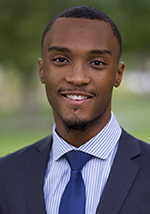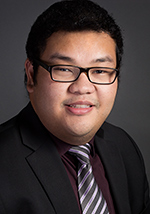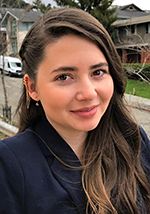Trio of Student Fellows Spread Saltman Center’s Mission
They come from different backgrounds and are likely to travel different career paths. But one thing Boyd students Robin Gonzales, Caleb L. Green, and Jen A. Smith do share is an interest in conflict resolution, as well as a desire to help their colleagues better understand why it’s crucial to develop and sharpen ADR skills.
Gonzales, Green and Smith are now passionately promoting that latter message as Saltman Center Student Fellows. Recently, the trio—all of whom earned their bachelor’s degrees at UNLV—sat down and discussed why conflict resolution appeals to them and the work they’re doing as Fellows.

How did you become interested in dispute resolution?
Robin Gonzales: I was born and raised in the southern part of the Philippines, which was a very conflicted area with rebel insurgencies and violent strife. So early on I recognized the value of conflict resolution as a way to solve problems. That got me interested in law school. I moved here, went to UNLV, and did my honors thesis on conflict resolution. I also did the Brookings Public Policy program, which taught me the value of public policy in finding solutions to problems.
Jen A. Smith: I didn’t know what I wanted to practice when I got to law school; I just knew I probably didn’t want to do criminal law. Ironically, I ended up working a summer job on the criminal side of the City of Henderson’s City Attorney’s office. I realized that, as interesting as it is, I’m not at all into litigation. … Then Robin got me to try parking arbitration and [I discovered that] ADR can apply to any field of law. So I can keep my options open but still develop the skills I’m going to need in whatever field I end up practicing in.
Caleb A. Green: There are two prongs to my interest in dispute resolution. One relates to intellectual property, which is the type of law I want to practice. This summer, I worked as an associate at Dickinson Wright, which is a national firm that deals with a lot of internet law issues. Well, there are federal statutes that mandate arbitration, mediation—some form of alternative dispute resolution—especially when you’re dealing with cases involving domain names. You have to exhaust those resources and those remedies until you take cases to litigation. And my job was to deal with a lot of those things.
The second part pertains to religion. I grew up in church—the reason we moved to Las Vegas 10 years ago from Lansing, Michigan, was [to open] a second church here. And in the religious community, there’s a big reluctance to take people to court who are in your same religion. So these religious organizations often look to ADR tools and resources, such as arbitration, where both parties choose someone they trust—a neutral individual, a pastor—to arbitrate certain issues and help them come to a fair and reasonable agreement. Those two areas—my religious personal life and my profession—are what got me interested in dispute resolution.

Gonzales: It means I get to hone the interest I have, that being conflict resolution. Unlike Jen, I am interested in trial and litigation, but I’m also interested in the broader aspects of being a lawyer. So being able to practice and hone those skills with the Saltman Center, which is ranked ninth in the nation, is amazing.
Smith: I like the idea that we get to plan events so the campus can get more involved in and knowledgeable about ADR, especially since what you see on TV is always trials. But trials are just one field of law, and most cases don’t end up going to trial; they’re solved before that point. So this is an opportunity to get the campus more involved in things that are more ADR related.
Green: One reason I wanted to be a Saltman Fellow is I felt like I would be an ambassador—or maybe the right word is catalyst—to illuminate the importance of these practical skills. Because there is this idea that if I want to be a lawyer, I’m going to be in court, it’s going to be adversarial, and that’s going to be the majority of my job. When in reality, as Jen mentioned, the majority of cases end up in settlement, which require negotiations. So anytime there’s a settlement, you’re putting conflict resolution skills to work.

Gonzales: In the past, we’ve held discussion panels on the different types of ADR, because [conflict resolution] really is across the board. We’ve held a panel where we had an employment discrimination mediator, a sports arbitrator, people involved in family disputes—all talking about the skills they use and what got them into their particular practice.
Smith: And Robin is working to revive the dispute resolution student organization.
Gonzales: It’s been dormant, but we’re restarting it. We’re thinking of calling it the Dispute Resolution Society, which will work hand in hand with the Saltman Center, sort of centralizing all that we do, from event planning and promotion to getting pro bono opportunities so students can get involved in ADR and get hands-on experience in the community. … It’s a work in progress right now, but we’ve generated a lot of interest already.
Green: We’re also trying to revive an interest in negotiations by getting students to compete in negotiation competitions. There’s a big emphasis on moot court and mock trial [at Boyd], but there’s not so much on negotiations. But negotiation is a big part of conflict resolution. We’re talking about bringing an in-house negotiation competition back to UNLV for next academic year—that’s one of our big goals, as well as putting a team together to compete in national competitions. But the first step, of course, is getting the Dispute Resolution Society back up and running.
In addition to the pro bono opportunities Robin referenced, we also want to give students the chance to shadow attorneys, so we’re working with groups like JAMS, which is a big ADR organization here in Las Vegas. Lastly, we want to introduce students to all the different aspects of ADR and give them the programming resources and opportunities so they can actually hit the ground running after they graduate.